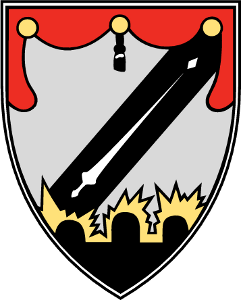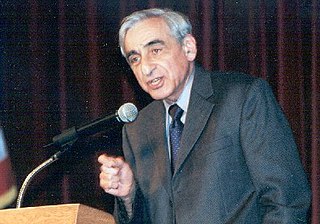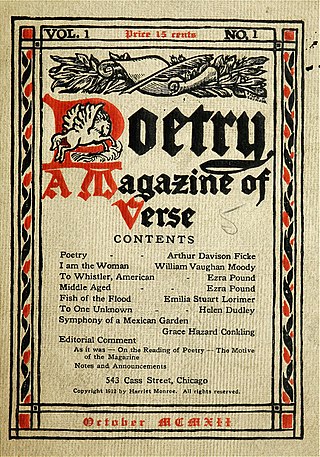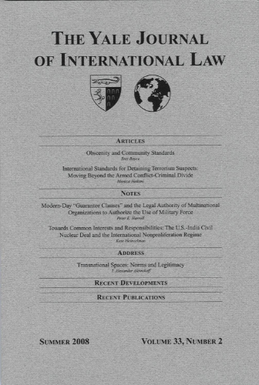
Music journalism is media criticism and reporting about music topics, including popular music, classical music, and traditional music. Journalists began writing about music in the eighteenth century, providing commentary on what is now regarded as classical music. In the 1960s, music journalism began more prominently covering popular music like rock and pop after the breakthrough of The Beatles. With the rise of the internet in the 2000s, music criticism developed an increasingly large online presence with music bloggers, aspiring music critics, and established critics supplementing print media online. Music journalism today includes reviews of songs, albums and live concerts, profiles of recording artists, and reporting of artist news and music events.
The Yale school is a colloquial name for an influential group of literary critics, theorists, and philosophers of literature that were influenced by Jacques Derrida's philosophy of deconstruction. Many of the theorists were affiliated with Yale University in the late 1970s, although a number of the theorists – including Derrida himself – subsequently moved to or became affiliated with the University of California, Irvine.

Biblical studies is the academic application of a set of diverse disciplines to the study of the Bible. For its theory and methods, the field draws on disciplines ranging from ancient history, historical criticism, philology, textual criticism, literary criticism, historical backgrounds, mythology, and comparative religion.

Cleanth Brooks was an American literary critic and professor. He is best known for his contributions to New Criticism in the mid-20th century and for revolutionizing the teaching of poetry in American higher education. His best-known works, The Well Wrought Urn: Studies in the Structure of Poetry (1947) and Modern Poetry and the Tradition (1939), argue for the centrality of ambiguity and paradox as a way of understanding poetry. With his writing, Brooks helped to formulate formalist criticism, emphasizing "the interior life of a poem" and codifying the principles of close reading.

The David Geffen School of Drama at Yale University is a graduate professional school of Yale University, located in New Haven, Connecticut. Founded in 1924 as the Department of Drama in the School of Fine Arts, the school provides training in every discipline of the theatre – acting, design, directing, dramaturgy and dramatic criticism, playwriting, stage management, technical design and production, and theatre management. It was known as the Yale School of Drama until its endowment by David Geffen in 2021.

Michael Laban Walzer is an American political theorist and public intellectual. A professor emeritus at the Institute for Advanced Study (IAS) in Princeton, New Jersey, he is editor emeritus of Dissent, an intellectual magazine that he has been affiliated with since his years as an undergraduate at Brandeis University. He has written books and essays on a wide range of topics—many in political ethics—including just and unjust wars, nationalism, ethnicity, Zionism, economic justice, social criticism, radicalism, tolerance, and political obligation. He is also a contributing editor to The New Republic. To date, he has written 27 books and published over 300 articles, essays, and book reviews in Dissent, The New Republic, The New York Review of Books, The New Yorker, The New York Times, Harpers, and many philosophical and political science journals.
René Wellek was a Czech-American comparative literary critic. Like Erich Auerbach, Wellek was an eminent product of the Central European philological tradition and was known as a vastly erudite and "fair-minded critic of critics."

A literary magazine is a periodical devoted to literature in a broad sense. Literary magazines usually publish short stories, poetry, and essays, along with literary criticism, book reviews, biographical profiles of authors, interviews and letters. Literary magazines are often called literary journals, or little magazines, terms intended to contrast them with larger, commercial magazines.

Signs: Journal of Women in Culture and Society is a peer-reviewed feminist academic journal. It was established in 1975 by Jean W. Sacks, Head of the Journals Division, with Catharine R. Stimpson as its first editor in Chief, and is published quarterly by the University of Chicago Press. Signs publishes essays examining the lives of women, men, and non-binary people around the globe from both historical and contemporary perspectives, as well as theoretical and critical articles addressing processes of gendering, sexualization, and racialization.
Michael Martin Fried is a modernist art critic and art historian. He studied at Princeton University and Harvard University and was a Rhodes Scholar at Merton College, Oxford. He is the J.R. Herbert Boone Professor Emeritus of Humanities and Art History at the Johns Hopkins University, Baltimore, Maryland, United States.
Edward Benjamin Rothstein is an American critic. Rothstein wrote music criticism early in his career, but is best known for his critical analysis of museums and museum exhibitions.
Stanley Kauffmann was an American writer, editor, and critic of film and theater.

The American Oriental Society was chartered under the laws of Massachusetts on September 7, 1842. It is one of the oldest learned societies in America, and is the oldest devoted to a particular field of scholarship.

The Yale School of Architecture (YSoA) is one of the constituent professional schools of Yale University, and is generally considered to be one of the best architecture schools in the United States. The School awards the degrees of Master of Architecture I (M.Arch I), Master of Architecture II (M.Arch II), Master of Environmental Design (M.E.D), and Ph.D in architectural history and criticism. The School also offers joint degrees with the Yale School of Management and Yale School of the Environment, as well as a course of study for undergraduates in Yale College leading to a Bachelor of Arts. Since its founding as a department in 1916, the School has produced some of the world's leading architects, including Norman Foster, Richard Rogers, Maya Lin and Eero Saarinen, among others. The current dean of the School is Deborah Berke.
Robert I. Weisberg is an American lawyer. He is an Edwin E. Huddleson, Jr. Professor of Law at Stanford Law School, and an expert on criminal law and criminal procedure, as well as a leading scholar in the law and literature movement.

The Yale Journal of International Law is a student-edited international law review at the Yale Law School. The journal publishes articles, essays, notes, and commentary that cover a wide range of topics in international and comparative law.
John J. Collins is the Holmes Professor of Old Testament Criticism and Interpretation at Yale Divinity School. He is noted for his research in the Hebrew Bible, as well as the apocryphal works of the Second Temple period including the sectarian works found in Dead Sea Scrolls and their relation to Christian origins. Collins has published and edited over 300 scholarly works, and a number of popular level articles and books. Among his best known works are the Between Athens and Jerusalem: Jewish Identity in the Hellenistic Diaspora ; Daniel in the Hermeneia commentary series ; The Scepter and the Star. The Messiahs of the Dead Sea Scrolls and Other Ancient Literature ; and The Bible after Babel: Historical Criticism in a Postmodern Age.

Harold Bloom was an American literary critic and the Sterling Professor of Humanities at Yale University. In 2017, Bloom was called "probably the most famous literary critic in the English-speaking world." After publishing his first book in 1959, Bloom wrote more than 50 books, including over 40 books of literary criticism, several books discussing religion, and a novel. He edited hundreds of anthologies concerning numerous literary and philosophical figures for the Chelsea House publishing firm. Bloom's books have been translated into more than 40 languages. Bloom was elected to the American Philosophical Society in 1995.
The Yale Journal of Law and Feminism is a law review published biannually by Yale Law School. It was established in 1987 to provide a forum for "women's experiences as they have been structured, affected, controlled, discussed, and ignored by the law." The journal publishes articles, inter alia, on reproductive freedom, the concerns of women of color, judicial prosecution of prostitutes, criticism of judicial deference to the military, and the feminization of poverty.
Philip Kennicott is the chief Art and Architecture Critic of The Washington Post.










